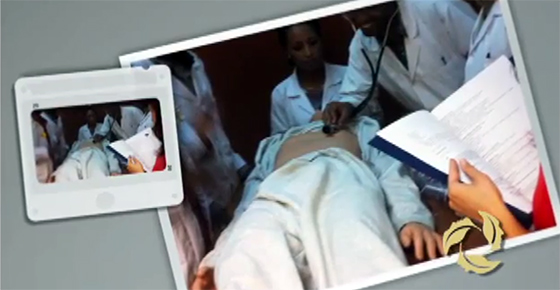
Above, a screen shot from Dr. Megan Landes' grant application video shows physicians being trained in Ethiopia.(Photo: UHN/YouTube)
Three UHN researchers are among 83 innovators selected to receive the Canadian government's Grand Challenges Canada, “Stars in Global Health” seed grant. Drs. Barry Rosen, Megan Landes and Isaac Bogoch will each receive $100,000 in funding for their novel ideas addressing health problems in resource-poor countries.
Four-hundred and fifty-one grant applications were submitted by social entrepreneurs, private sector companies, non-government organizations and university researchers.
In early 2013, UHN researchers submitted short video applications describing their ideas and how the grant would help them achieve global impact.
Treating cervical cancer in Kenya
Dr. Barry Rosen proposed implementing a “See and LEEP” strategy for women in Western Kenya with positive cervical cancer screening.
Roughly 450,000 women worldwide are diagnosed with cervical cancer and 260,000 die each year, with 80 per cent of those affected living in low- and middle-income countries.
LEEP is highly effective at treating the malignant disease, has low morbidity and can be used in a low-resource setting.
Doctor shortage: Addressing the needs
In her video submission, Dr. Megan Landes, highlighted the urgency of training and retaining doctors in Ethiopia, where a critical health worker shortage has left one doctor per 45,000 people.
Landes proposed the implementation of TAAAC-EM, which engages the world’s best teachers to inspire a generation of health providers to remain at home and serve in their country without sacrificing their careers.
Diagnosing without electricity, equipment
Dr. Isaac Bogoch explained an innovative approach to diagnose typhoid and other common infections in settings without electricity, sophisticated equipment or trained laboratory personnel.
Bogoch proposed implementing this approach in Bangladesh, India, Nepal and Pakistan.
Grantees will use their $100,000 award to put their proposals into practice. Of the grants, 50 were given to innovators in low- and middle-income nations worldwide and 33 were given to Canadian-originated projects.
To read the Grand Challenges Canada press release and full list of grantees, click here.
For more information on the Government of Canada’s Grand Challenges Canada “Stars in Global Health” program,
click here.
Related
